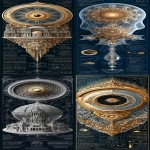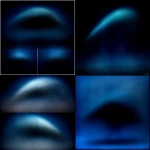Explore the Best AI Image Gallery
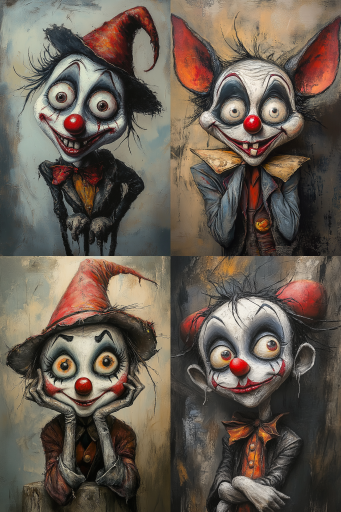
Quantum Computing: Revolutionizing Creativity and Ethical Considerations
Quantum computing, long seen as a theoretical concept, is now emerging as a groundbreaking technology that promises to reshape various industries, including the creative sector. Unlike classical computers, quantum computers utilize the principles of quantum mechanics, enabling them to perform complex calculations at speeds unimaginable in the classical paradigm. This unique capability could revolutionize how artists, designers, and content creators approach their work, while also presenting ethical dilemmas and challenges that must be carefully navigated.
The Impact on the Creative Industry
The implications of quantum computing for the creative industry are vast and multifaceted. Quantum computers could unlock new possibilities for simulation, modeling, and rendering, allowing creators to explore realms previously rendered impractical by current computing limitations. Here are some ways quantum computing might influence creativity:
- Enhanced Simulation and Design: Artists and designers often use simulation software for rendering realistic environments. Quantum computers can handle vast amounts of data at incredible speeds, allowing creators to simulate complex environments such as lifelike animations, detailed virtual worlds, or even intricate visual effects in films.
- Generative Art: Quantum algorithms can lead to new forms of generative art, where algorithms create artwork through quantum randomness. The unpredictability inherent in quantum systems can lead to unique, one-of-a-kind artworks that challenge traditional notions of authorship and creativity.
- Data-Driven Insights: With quantum computing's ability to analyze extensive datasets quickly, creatives can gain deeper insights into audience preferences, trends, and styles. This data can inform decisions, leading to more engaging and targeted content.
- AI Collaboration: The synergy between AI and quantum computing can give rise to innovative tools and applications that assist creators in developing content. Tools powered by quantum computing could produce music, art, or even literary works in collaboration with human creators, expanding the horizons of artistic expression.
Potential Applications of Quantum Computing
As quantum computing becomes more accessible, its potential applications extend beyond art and design. Here are several domains poised to benefit from quantum advancements:
- Film and Animation: Quantum computing may transform film production by allowing for faster special effects rendering, realistic character movements, and even enhanced storytelling techniques that require complex decision trees.
- Fashion Design: With the ability to analyze fashion trends and consumer data swiftly, quantum computing could revolutionize the design process, allowing fashion designers to create garments that resonate more deeply with consumer desires.
- Music Composition: Tools that leverage quantum computing could aid musicians in experimenting with sound and composition in innovative ways, leading to new genres and styles of music still yet to be discovered.
Ethical Considerations
As with any emerging technology, the intersection of quantum computing and the creative industries raises critical ethical questions. Some of the key considerations that deserve attention include:
- Intellectual Property: With the rise of AI-generated and quantum-assisted artworks, questions arise about authorship. Who owns an artwork created by an AI algorithm based on quantum computations? Legal frameworks may need to evolve to address these new realities.
- Access and Inequality: The high cost of quantum computing technology could lead to an unequal distribution of its benefits. If only a few corporations control quantum resources, it could widen the gap between large institutions and individual artists or smaller creative teams.
- Deepfakes and Misinformation: The power of quantum computing to create hyper-realistic simulations could lead to the production of deepfakes and other misleading content. The creative industry must grapple with the potential misuse of technology that could erode trust in artistic media.
Future Trends
As the field of quantum computing advances, we can expect several trends to emerge in its relationship with creativity:
- Interdisciplinary Collaboration: The fusion of computer science, art, and ethics will drive new interdisciplinary collaborations. Artists, technologists, and ethicists will work together to explore the implications of quantum computing on the creative landscape.
- Democratization of Tools: As quantum computing technology matures, we may see the development of more user-friendly tools that promote democratization, allowing creators at all levels to harness its power.
- Focus on Responsible Innovation: The creative industry will likely prioritize responsible practices when using quantum technologies, ensuring that advancements benefit society as a whole while mitigating potential harms.
In conclusion, quantum computing stands at the precipice of transforming the creative industries. By catalyzing new forms of artistic expression and raising essential ethical questions, this technology not only expands the horizons of creativity but also demands thoughtful consideration of its implications. The journey of quantum computing will be one of discovery—an exploration into how it intersects with art, ethics, and technology in an ever-evolving world.

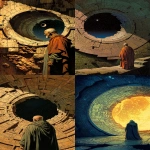

](https://images.ai-img.art/thumbnails/150/c567a1358478083ae41a0cfe6091474ff06e613a84b6c29ca3a26beb2bd76142.webp)

](https://images.ai-img.art/thumbnails/150/99160160c478b524ba92aa139b5b6aef0be4f3368720294c1dc3fe8fc4cbdd90.webp)



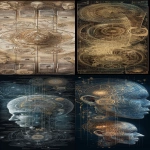

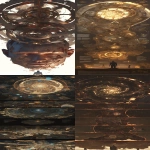




](https://images.ai-img.art/thumbnails/150/6ac2c201a41e2b8724571746d5719f3f25acc52d87a2077f62dcbae44495108e.webp)
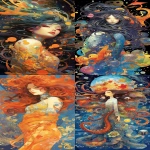
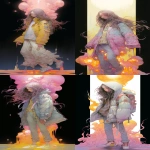

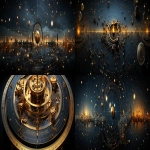

](https://images.ai-img.art/thumbnails/150/d912741b1ab16ff573f976b1d875060fed0db91bf03973bae8f91338eb0863a8.webp)
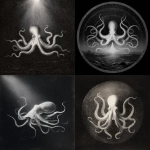
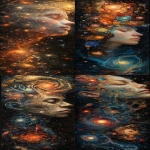

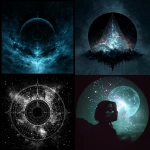
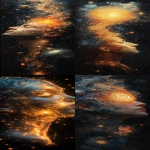



](https://images.ai-img.art/thumbnails/150/0349dd8cf310ed10eba1fc74a6f316b8982c8c2bda7e033d1c1e3dc87d849258.webp)





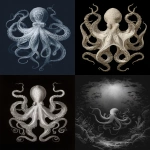

](https://images.ai-img.art/thumbnails/150/ddfcd3cfcd96dd8d48f26fc2a0406d5daa1e8ff5c17fd91de6502c7107ca08ac.webp)
